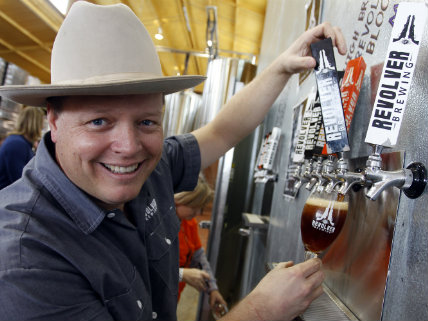No Free Beer: Texas Judge Strikes Down Law Forbidding Breweries From Selling Distribution Rights
Distributors banded together in 2013 to pass a law that violates the state constitution.

A Texas judge on Thursday struck down a state law prohibiting breweries from negotiating with distributors over where their beer can be sold.
Under the terms of the law ruled unconstitutional in district court this week, breweries were forbidden to sell their so-called "territorial rights." In other words, breweries were banned from accepting money from a distributor in exchange for giving that distributor the exclusive right to sell a certain beer in a certain area—essentially requiring most Texas breweries to give away those rights for free.
Texas, like many states, uses the so-called "three-tiered system" to govern the sale of alcohol. Distributors serve as middle men between breweries and retailers like bars and restaurants. The entire model is a hold-over from the tail end of the Prohibition era and basically serves to protect distributors' share of the market, even without additional rules like this one, which was passed in 2013 at the behest of—you guessed it—the distributors.
Brewers had opposed the law when it was passed, and three Texas breweries banded together to challenge the law in court. They argued that it required them to give away their territorial rights for free instead of allowing them to sell to the highest bidder.
District Judge Karin Crump agreed and struck down the law as a violation of the Texas state constitution's prohibition against laws that deprive individuals of their property without due process.
"This law took part of my business away from me and gave it to big distributors. Now I've got my business back," said Chip McElroy, owner of Austin-based Live Oak Brewing, in a statement. Live Oak was one of three plaintiffs in the case, along with Revolver Brewing of Fort Worth and Peticolas Brewing of Dallas. All three were represented by the Institute for Justice, a libertarian law firm that challenges overreaching governmental regulations.
Matt Miller, a senior attorney at IJ, said this week's ruling was "a victory for every Texas craft brewery and customers who love their beer."
The Texas Alcoholic Beverage Commission offered no comment on the ruling. Spokesman Chris Porter said in an email the TABC was conferring with the Texas Attorney General's Office and had not yet decided whether to move forward with an appeal.
Breweries in Texas are allowed to self-distribute their products as long as they make less than 125,000 barrels of beer per year. Once they surpass that arbitrary threshold, state law requires that their sell their products to a distributor. Brewers are allowed to use a distributor if they produce less than 125,000 barrels per year, as McElroy's brewery did because they did not have workers or trucks to get their beer to other parts of the state.
McElroy previously contracted with a distributor in Houston and had plans to sell his beer in other parts of the state, but cancelled those plans after the new law took effect, he said in court documents.
Brewers are free to contract with different distributors in different parts of the state, but have to choose a single distributor for any given area. That's why territorial rights have value, since multiple distributors serving one city would have to bid against each other for the right to sell a given product. The 2013 law changed all that. By requiring breweries to give away territorial rights for free, distributors were no longer required to compete with each other on that point. Distributors pushed for the change because the recent explosion in craft breweries meant they had to buy territorial rights from an ever-growing number of new producers.
The law essentially took away part of brewers' property rights—"a very un-Texan thing to do," Michael Peticolas, owner of Peticolas Brewing, told the American Bar Association Journal in May.
There are 189 craft breweries in Texas, according to the Brewer's Association, a national trade group. They produced more than 1.1 million barrels of beer in 2015 and generated $3.7 billion for the Texas economy.
Thursday's ruling leaves Kentucky as the only state in the country with a similar law on the books.


Show Comments (12)